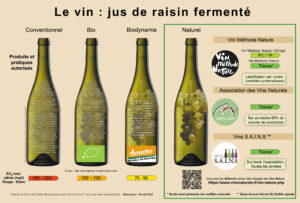Simply put
By definition, wine is a cultural product. You can’t stumble across some wine out in the wild, it requires the intervention of a winegrower to make it from grapes (those guys are natural).
So simply put, natural wine is a wine which is made as naturally as possible:
– No synthetic products: not in the vineyards, not in the cellar, anywhere
– Manual harvesting
– A total sulphur/SO2 level lower than 40mg/L
In other words, we aim for pure fermented grape juice. Yes, this should always be the case, but it’s not that simple. Nature is capricious and we don’t follow its rhythm anymore.
A bit of History
The history of naturally produced wine goes back to Antiquity, well before the arrival of 20th century industrial winemaking techniques, which were doubly amplified by the Second World War: the rapid development of petrochemicals (notably for armaments) and the race for yield (during reconstruction).
In France in the 1980s, the movement for a return to natural wine production was spearheaded by such illustrious figures as the Beaujolais “négociant-éléveur” Monsieur Jules Chauvet, who was also a writer, scientist and fine wine taster. Jules Chauvet was a pioneer, one of those rare human beings for whom the adjective “genius” means something. As early as the 1950s, he was producing natural wines. His methods slowly caught on with curious minds such as Jacques Néauport, itinerant wine producer, and the emblematic Beaujolais winemaker Marcel Lapierre (and many others).
During the 90s, the natural wine movement continued to gain popularity in France, Italy and Slovenia, then spread rapidly across Europe and the world (including the USA and Australia) from the 2000s onwards.
Nowadays
Today – as the general public becomes increasingly aware of the benefits that such production brings to their health and that of our environment – many winemakers are converting their vineyards or opting from the outset for healthy agriculture and natural winemaking methods.
The image below summarises the differences in winemaking methods:
And as we are seeing a wave of greenwashing, keep one thing in mind: free wine doesn’t exist. Either we pay with cash, or we pay the price by damaging the environment.


